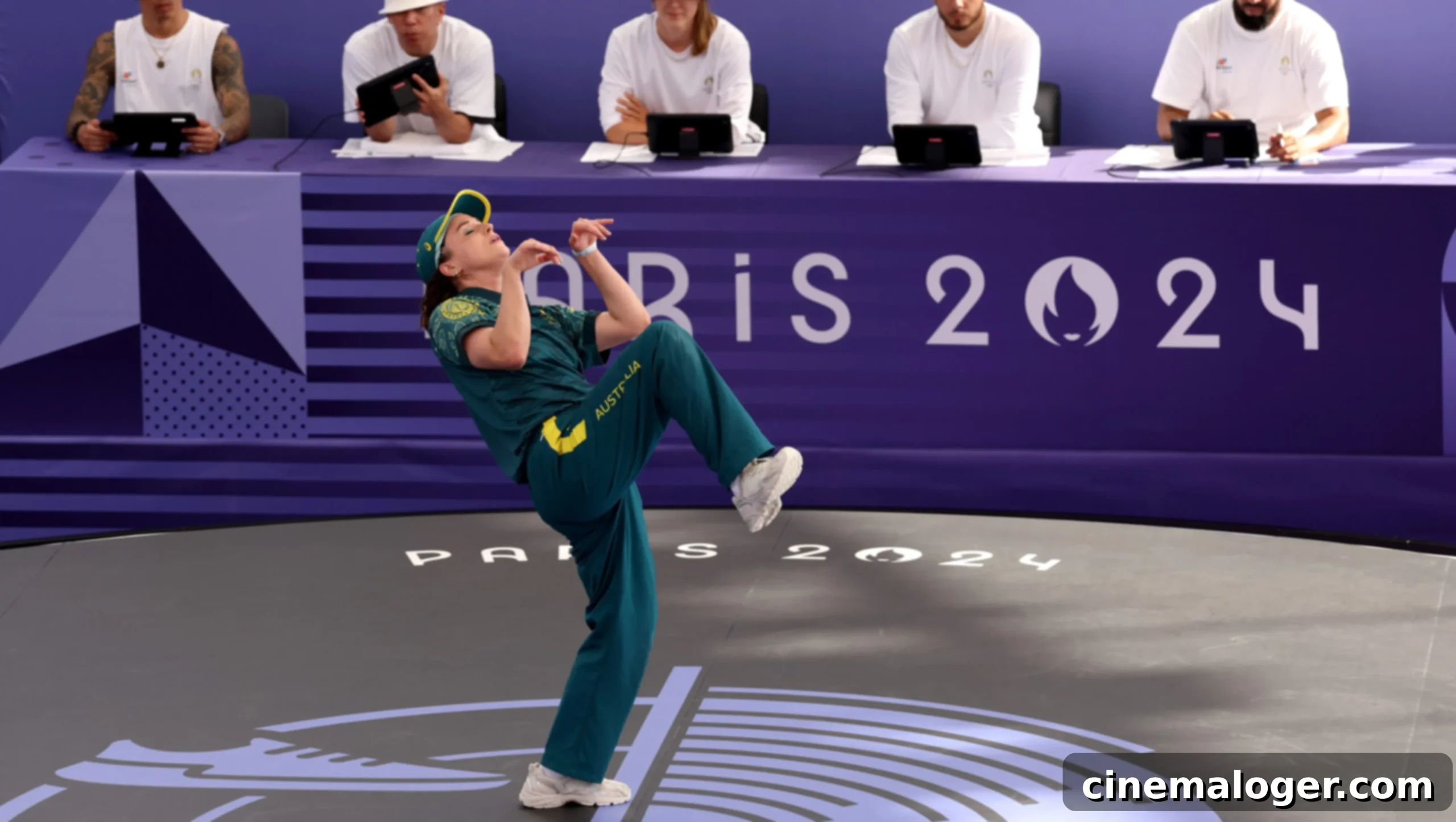Rachael ‘Raygun’ Gunn Addresses Paris 2024 Breaking Controversy and Olympic Backlash
Australian B-girl Rachael “Raygun” Gunn found herself at the epicenter of a global debate following her groundbreaking yet highly controversial performance at the 2024 Paris Summer Olympics. Her Olympic debut in Breaking, a sport making its first-ever appearance on the grandest sporting stage, quickly went viral, not for triumphant victories, but for an overwhelming and often harsh wave of online criticism. Weeks after the events that captivated and divided audiences worldwide, Gunn finally sat down for an exclusive interview, offering her perspective on the immense backlash she received during the Summer Games.
Speaking to Australia 10 News in an interview aired Wednesday, the 37-year-old artist and athlete expressed her sorrow regarding the widespread negative reactions. “It is really sad to hear those criticisms, and I am very sorry for the backlash that the community has experienced,” Gunn stated, acknowledging the broader impact on the Breaking community. However, she quickly added a note of defiance and realism: “But I can’t control how people react.” This statement encapsulates her stance, a blend of empathy for the community and unwavering conviction in her own artistic expression, even in the face of unprecedented scrutiny.
Breaking’s Historic Debut and Raygun’s Unconventional Performance
The 2024 Paris Games marked a pivotal moment for Breaking, as it stepped into the Olympic spotlight for the first time. Hailed by proponents as a vibrant, dynamic art form deserving of global recognition, its inclusion aimed to introduce a new, youthful energy to the Olympic program. Rachael Gunn, representing Australia, was one of the pioneers in this historic event. However, her performance quickly became the subject of intense scrutiny and confusion among spectators and critics alike. In each of her battles against three formidable competitors – the U.S.’s Logan Edra (Logistx), Lithuania’s Dominika Banevič (Nicka), and France’s Sya Dembélé (Syssy) – Gunn failed to earn a single point, resulting in a stark 18-0 loss in every round. These scores, unheard of in competitive Breaking at this level, amplified the public’s bewilderment.
Gunn, a vocal proponent of originality and artistic integrity within Breaking, defended her approach by stating, “All of my moves are original.” This declaration, while underscoring her commitment to unique expression, seemed to clash with the expectations of some judges and a wider audience who may have been looking for more conventional power moves, fluidity, and technical execution typically rewarded in competitive Breaking. The stark contrast between her artistic vision and the judges’ scores sparked a global conversation about the criteria for judging artistic sports, the balance between innovation and tradition, and the inherent subjectivity involved in evaluating performance art within a competitive framework.

Defending Her Record and Academic Background
Beyond the immediate controversy surrounding her Olympic performance, Gunn’s qualifications and standing within the Australian Breaking community also came under fire. When confronted with the question of whether she genuinely believed she was the ‘best female breaker in Australia,’ Gunn, who holds a significant academic role as a breakdancing professor at Macquarie University in Sydney, responded with a confident shrug. “Well, I think my record speaks to that,” she asserted, pointing to her consistent ranking as the “top-ranked” breaker in Australia in 2020, 2022, and 2023. This track record, accumulated over several years of dedicated competition and training, serves as a testament to her past achievements and expertise within the sport. She added, “The record is there, but anything can happen in a battle,” acknowledging the unpredictable nature of live competition, especially in a subjective art form like Breaking. Her academic background, teaching and researching the cultural and physical aspects of breaking, provides her with a unique perspective, bridging the gap between practical performance and theoretical understanding of the art form.
This dual role as both an academic and a competitive B-girl has made her situation particularly complex. While her academic credentials underscore her deep knowledge and dedication to Breaking, the public debate often overlooks these nuanced contributions, focusing instead on the singular metric of Olympic scores. Her continued success in national rankings prior to the Olympics, coupled with her academic contributions, paints a picture of a breaker deeply embedded in the sport’s evolution, even as her Olympic performance became a lightning rod for criticism.
The Storm of Accusations: Cheating Allegations and Conspiracy Theories
The online backlash against Rachael Gunn escalated beyond mere criticism of her performance, veering into serious accusations of impropriety. Last month, an online petition garnered over 50,000 signatures amid “unfounded accusations” that Gunn had manipulated the selection process to secure her Olympic spot. These allegations suggested that despite qualifying for the Olympics by winning last year’s Oceania Breaking Championships, her path to Paris was somehow tainted by unfair advantages or corrupt practices. The sheer volume of signatures on the petition underscored the deep skepticism and anger some segments of the public felt.
Gunn expressed profound distress over these particular claims, noting the significant emotional toll they took. “That was really upsetting because it wasn’t just people that didn’t understand breaking and were just angry about my performance,” she explained. “It was people attacking our reputation and our integrity. And none of them were grounded in any kind of facts. People still don’t believe the truth, but… I think that’s just going to be part of our reality, unfortunately.” These accusations, hitting at the core of her professionalism and character, were far more damaging than critiques of her dance style. Gunn, who has yet to return to Australia since the Games, firmly dismissed these claims as “conspiracy theories,” labeling them “just awful.” The challenge, as she perceives it, is to navigate a landscape where misinformation spreads rapidly, and truth often struggles to gain traction against sensational narratives.
Embracing Originality: Gunn’s Artistic Philosophy
Throughout the intense scrutiny, Rachael Gunn has consistently championed her philosophy of originality and artistic expression within Breaking. Prior to her interview, she had already addressed the criticism on social media, sharing an Instagram post from the Australian breaking team that prominently featured her quote: “Don’t be afraid to be different.” This mantra encapsulates her approach to an art form that, while competitive, thrives on individual style and innovation. She further elaborated on this, emphasizing personal representation: “Go out there and represent yourself. You never know where that’s gonna take you.” For Gunn, Breaking is not merely a sport but a profound avenue for self-expression, a platform to showcase one’s unique identity.
During an August 10 press conference, as reported by ESPN, Gunn reiterated the core of her artistic belief: “Creativity is really important to me. I go out there, and I show my artistry. Sometimes it speaks to the judges, and sometimes it doesn’t. I do my thing, and it represents art. That is what it is about.” This statement highlights the inherent tension between artistic freedom and competitive scoring. In a sport where judges evaluate factors like technique, originality, execution, and musicality, an emphasis on pure artistry, particularly a highly original one, might not always align perfectly with conventional scoring criteria. Gunn’s commitment to pushing boundaries, even if it meant sacrificing competitive points in this instance, underscores her unwavering dedication to her artistic vision, viewing her performance not as a failure, but as an authentic representation of her craft.
The Broader Impact and Future of Breaking
Rachael Gunn’s experience at the Paris 2024 Olympics has ignited a crucial discussion about the future of Breaking as an Olympic sport, and indeed, about the integration of highly subjective art forms into competitive sporting events. The controversy has forced a re-evaluation of judging criteria, the role of originality versus established techniques, and how the sport communicates its complexities to a global audience unfamiliar with its nuances. The “backlash that the community has experienced,” as Gunn put it, extends beyond her personal ordeal; it reflects a broader challenge for Breaking to define its identity and ensure fair representation on the international stage.
Despite the adversity, Gunn remains resolute. Her determination to stay true to her artistic roots and to defend her integrity speaks volumes about her character and commitment to Breaking. As the dust settles and conversations continue about the sport’s potential return in future Olympic Games, her story will undoubtedly serve as a significant case study. It highlights the fine line between innovation and expectation, the pressures faced by pioneering athletes, and the enduring power of artistic expression even amidst intense global scrutiny. Gunn’s journey underscores the fact that while medals are important, the spirit of challenging norms and inspiring authenticity often leaves a more lasting legacy.
